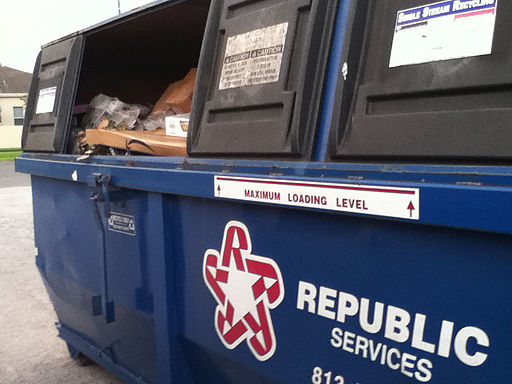In February, Republic Services (RSG +0.13%) closed a nearly $500 million deal to buy oilfield waste operations from Canada's Tervita Corp. In mid 2013, Waste Management (WM +1.39%) bought two companies that offer similar services. Is this a huge growth opportunity, or are these refuse specialists going to regret this expansion now that oil prices have collapsed?
On the way up
When Waste Management bought Summit Energy Services and Liquid Logistics a few years ago, the fracking boom was still booming. At the WasteExpo Conference and Exposition in New Orleans that year, industry watchers pegged the potential market for oilfield waste services at as much as $30 billion annually. No wonder Waste Management wanted in. The largest U.S. trash hauler posted revenues of roughly $14 billion last year. It takes a lot to move the top line, and that kind of industry opportunity is meaningful.

Source: ReubenGBrewer, via Wikimedia Commons.
But how is that working out now that oil prices have fallen? When asked about further acquisitions in this area during the fourth-quarter conference call, CEO David Steiner explained that, "Yes. We're probably looking at it a lot harder at $80 oil then $50 oil. But look, over the long-term, I think that's going to be a very good business. If we could get assets in that line of business at the right price, we would certainly look at doing that."
However, he added that, "...I would tell you that the right price today is not what the right price was six months ago. And so, it would have to be something where we would feel fairly confident that over the long-term, we could make the business profitable."
Republic gets involved
So the timing of Republic's purchase in the same sector is interesting. Waste Management essentially says caution is in order because low oil prices present a risk. And that's a notable risk, since the number of oil rigs in operation has been falling quickly and is at its lowest level since 2011, according to oil services company Baker Hughes. Essentially, oil drillers are pulling back on production as falling oil prices make it harder to turn a profit.

Source: ReubenGBrewer, via Wikimedia Commons.
Fewer drilling rigs could turn Republic's investment into a notable drag if oil prices stay low and drilling activity continues to fall. That said, U.S. oil production is at its highest level since 1973. Drillers and drill rigs have become more productive, getting more out of every well. These two dueling issues will be worth watching for investors in Republic and Waste Management in the near term to see the actual impact on their businesses.
But according to Republic CEO Don Slager, "...the E&P [exploration and production] waste sector provides attractive long-term growth opportunities, and leverages our expertise in waste handling recovery in disposal." In other words, this isn't a deal meant for today, it's a deal meant to open up a new area in which to expand. While it's easier to move the top line at Republic, which had revenues of nearly $9 billion in 2014, finding new avenues to grow is still problematic, so this could be a great long-term opportunity.
A little at a time
So Republic may, indeed, be late to the current energy party, but it's looking longer term. That's effectively what Waste Management is thinking, too. And this sector fits within the pair's wheelhouse in many ways. For starters, they are handling waste -- that's what they do, and do well. But it also gives them another area in which to consummate bolt-on acquisitions. That's another thing they do and do well.
For example, in addition to the E&P deal, Republic's Slager also noted the addition of Rainbow Disposal, "...a high quality franchise business that complements our Southern California operations." Waste Management's Steiner noted that, "...our guidance assumes that we will not close any acquisitions in 2015, other than the previously announced acquisition of Deffenbaugh Disposal and our normal tuck-in acquisitions." Small "tuck-in" acquisitions are simply a part of doing business for this pair. And with a foot in the door of the drilling industry, they can both look forward to buying assets in a new sector.
Republic and Waste Management may find low oil prices a drag on their new businesses in the near term, but unless the U.S. oil industry goes out of business, which is highly unlikely, these moves are long-term positives. Moreover, low oil prices could actually lead to more acquisition opportunities if they bring acquisition prices down. So, for this pair, languishing oil prices could actually be a good thing.






